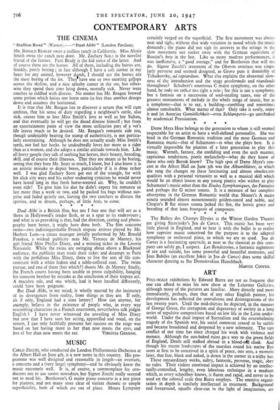MUSIC
CARLO ZECCHI, who conducted the London Philharmonic Orchestra at the Albert Hall on June 4th, is a new name in this country. His pro- gramme was well designed and reasonable in length—an overture, a concerto and a (very large) symphony—and he obviously knew the music extremely well. It is, of course, a commonplace for con- ductors not to use scores nowadays, but Signor Zecchi really seemed not to need his. Beethoven's G major piano concerto is a test piece for pianists, and not many steer clear of violent rhetoric or simple superficiality, both of which are out of place. Moura Lympany certainly verged on the superficial. The first movement was always neat and tight, without that wide variation in mood which the music demands ; the piano did not sigh its answers to the strings in the slow movement nor rocket away with the German equivalent of Rossini's brio in the last. Like so many modern performances, it was inoffensive, a ." good average," and for Beethoven that will not do. Signor Zecchi's treatment Of the Oberon overture was singu- larly perverse and seemed designed, as Grove puts it donnishly of Tchaikovsky, ad captandum. What else explains the abnormal slow- ness of the introduction and the stagy accelerando and ritardando throughout? Schubert's enormous C major symphony, on the other hand, he rode on rather too tight a rein ; for this is not a symphony, but a fantasia on a succession of soul-stealing tunes, one of the greatest monuments of melody in the whole range of music, but as a symphony—that is to say, a building—rambling and sometimes almost ramshackle. What matter of tkat? Only take it easily, enjoy it and let Austrian Gemdtlichkeit—even Schlamperei—go unrebuked by academical Prussianism.
* * * *
Dame Myra Hess belongs to the generation to whom it still seemed respectable for an artist to have a well-defined personality. She was bred in the German Romantic tradition and the most German and Romantic music—that of Schumann—is what she plays best. It is virtually impossible for pianists of a later generation to play this music. Warmth, fantasy, the confiding and even the arch manner, capricious tenderness, poetic melancholy—what do they know of these who only Bartok know? The high spot of Dame Myra's con- cert at the Albert Hall on June 5th was the Albumbldtter, in which she rang the changes on these fascinating and almost obsolescent qualities with a personal virtuosity as well as a musical skill which would be an object lesson to any young pianist who wishes to play Schumann's music other than the Etudes Symphoniques, the Fantaisie and perhaps the G minor sonata. It is a measure of her complete absorption in the German Romantic world that Mozarfs A major sonata sounded almost monotonously golden-toned and noble, and Chopin's B flat minor sonata lacked the fire, the heroic grace and breeding of that least bourgeois of composers.
* * * *
The Ballets des Champs Elysees at the Winter Garden Theatre are giving Suavinsky's Jeu de Cartes. This music has been very little played in England, and to hear it with the ballet is to realise how superior music conceived for the purpose is to the adapted symphony or orchestral piece, to which we are so used. yeu de Cartes is a fascinating spectacle, as near to the classical as this com- pany can safely go, I suspect. Les Rendezvous, a fantastic nightmare of sex and suicide, has some powerful and beautiful moments, and Jean Babilee (an excellent Joker in Jeu de Cartes) does some skilful character dancing as fhe Dostoievskian Hunchback.
MARTIN COOPER.


































 Previous page
Previous page